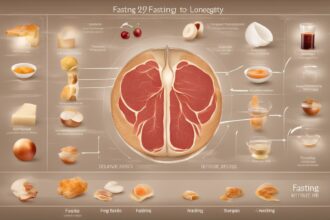Fasting has long been a practice rooted in cultural, spiritual, and health traditions across the world. In recent years, however, scientific research has begun to uncover its potential as a powerful tool for promoting a prolonged lifespan. By intentionally restricting food intake for specific periods, fasting triggers a cascade of biological processes that may enhance cellular repair, reduce inflammation, and improve metabolic health. In this article, we’ll explore how fasting can contribute to a longer, healthier life and provide actionable insights into incorporating it into your routine.
The Science Behind Fasting and Longevity
Fasting, whether intermittent or prolonged, induces a state of metabolic stress that prompts the body to adapt in remarkable ways. One of the key mechanisms behind a prolonged lifespan through fasting is autophagy, a cellular “clean-up” process where damaged or dysfunctional components are broken down and recycled. Studies suggest that autophagy, which is upregulated during fasting, plays a critical role in preventing age-related diseases such as Alzheimer’s and cancer. Additionally, fasting reduces oxidative stress and inflammation—two major contributors to aging—by lowering the production of free radicals and pro-inflammatory cytokines.
Another important factor is the impact of fasting on insulin sensitivity. By reducing calorie intake temporarily, fasting helps lower blood sugar levels and improve insulin function, which can decrease the risk of type 2 diabetes, a condition often linked to shortened lifespan. These combined effects create a cellular environment conducive to longevity, making fasting a promising strategy for those seeking to extend their years.
Types of Fasting for a Prolonged Lifespan
Not all fasting methods are created equal, and choosing the right one can depend on individual goals and lifestyles. Intermittent fasting (IF), for instance, involves cycling between periods of eating and fasting, with popular protocols like the 16:8 method (16 hours fasting, 8 hours eating) or the 5:2 diet (eating normally for 5 days and restricting calories for 2 days). This approach has been shown to support weight management and metabolic health, both of which are tied to longevity.
Prolonged fasting, on the other hand, typically lasts 48 hours or more and may offer deeper cellular benefits like enhanced autophagy. Water fasting, where only water is consumed, or fasting-mimicking diets (FMD), which involve low-calorie intake for several days, are examples of prolonged fasting methods. While more intensive, these approaches are often used under medical supervision to maximize safety and effectiveness. To learn more about different fasting methods, check out our detailed guide on Intermittent Fasting Basics.
Health Benefits of Fasting for Longevity
The potential health benefits of fasting extend far beyond weight loss. One of the most compelling advantages is its effect on cardiovascular health. Fasting has been shown to lower blood pressure, reduce LDL cholesterol levels, and improve triglyceride profiles—all of which decrease the risk of heart disease, a leading cause of mortality worldwide. By supporting heart health, fasting directly contributes to a prolonged lifespan.
Additionally, fasting may protect brain health by increasing the production of brain-derived neurotrophic factor (BDNF), a protein that supports neuron growth and resilience. This could lower the risk of neurodegenerative disorders like Parkinson’s and Alzheimer’s. Fasting also promotes better gut health by allowing the digestive system to rest and fostering a balanced microbiome, which is increasingly linked to overall longevity. For more on how gut health impacts aging, see our post on Gut Health and Longevity.
How Fasting Impacts Cellular Aging
At the cellular level, fasting influences aging by affecting telomeres—the protective caps at the ends of chromosomes that shorten as we age. Telomere shortening is associated with cellular senescence and age-related decline, but emerging research suggests that fasting may slow this process by reducing oxidative damage and supporting DNA repair mechanisms. While more studies are needed, these findings highlight fasting’s potential to extend cellular lifespan.
Fasting also activates sirtuins, a family of proteins that regulate cellular health and stress resistance. Sirtuins are often referred to as “longevity genes” because of their role in repairing DNA and maintaining metabolic balance. By upregulating sirtuin activity, fasting creates a cellular environment that resists aging and promotes a prolonged lifespan. Curious about other ways to slow cellular aging? Explore our article on Solutions for Cellular Aging.
Practical Tips for Starting a Fasting Regimen
While the benefits of fasting are enticing, it’s important to approach it thoughtfully to avoid potential pitfalls. Start by consulting with a healthcare provider, especially if you have pre-existing conditions like diabetes or are on medication. Beginners might find intermittent fasting more sustainable, beginning with a 12:12 schedule before progressing to longer fasting windows. Hydration is crucial during fasting periods—drink plenty of water and consider electrolyte supplements if fasting for extended durations.
Additionally, focus on nutrient-dense foods during eating windows to support overall health. Avoid overeating or indulging in processed foods, as this can negate fasting’s benefits. Lastly, listen to your body; if you experience dizziness, fatigue, or other adverse effects, adjust your fasting schedule or seek medical advice. For a deeper dive into safe fasting practices, read our guide on Safe Fasting Tips.
Potential Risks and Considerations
While fasting offers numerous benefits, it’s not without risks. Prolonged fasting, in particular, can lead to nutrient deficiencies, muscle loss, or electrolyte imbalances if not done correctly. Individuals who are pregnant, breastfeeding, underweight, or have a history of eating disorders should avoid fasting unless under strict medical supervision. Even intermittent fasting can cause irritability, headaches, or fatigue in the early stages as the body adjusts to new eating patterns.
It’s also worth noting that fasting isn’t a one-size-fits-all solution. Genetic factors, lifestyle, and existing health conditions can influence how someone responds to fasting. Always prioritize safety and sustainability over rapid results. For personalized advice on integrating fasting into your life, consider our resource on Personalized Longevity Plans.
Disclaimer: The information provided in this article is for educational purposes only and should not be considered medical advice. Fasting may not be suitable for everyone, and individual results can vary. Always consult with a qualified healthcare professional before starting any fasting regimen or making significant changes to your diet or lifestyle. The authors and publishers of this content are not responsible for any adverse effects or consequences resulting from the use of the information provided.
References
- de Cabo, R., & Mattson, M. P. (2019). Effects of Intermittent Fasting on Health, Aging, and Disease. New England Journal of Medicine.
- Longo, V. D., & Mattson, M. P. (2014). Fasting: Molecular Mechanisms and Clinical Applications. Cell Metabolism.
- Wei, M., et al. (2017). Fasting-Mimicking Diet and Markers/Risk Factors for Aging, Diabetes, Cancer, and Cardiovascular Disease. Nature.
- Horne, B. D., et al. (2019). Health Effects of Intermittent Fasting: Hormesis or Harm? Circulation Research.
- Mattson, M. P., et al. (2018). Intermittent Metabolic Switching, Neuroplasticity and Brain Health. Frontiers in Aging Neuroscience.
This content is for informational purposes only and not a substitute for professional advice.






